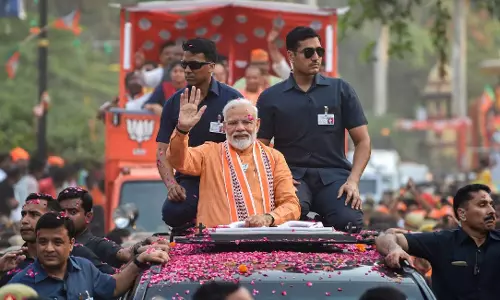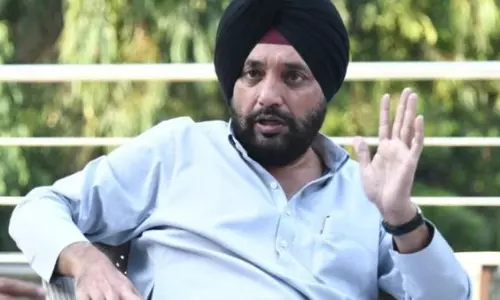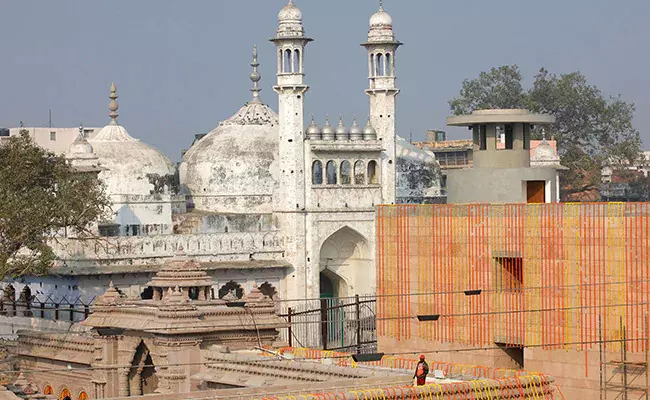
Do not let loose a chained demon using law
text_fieldsThe Supreme Court has now given permission to the Archaeological Survey of India (ASI) to conduct a survey of the Gyanvapi mosque complex, which was built during the Mughal rule in Uttar Pradesh's Varanasi, to determine if it was built on a pre-existing temple. The order of the Supreme Court rejects the appeal filed by the Anjuman Intazamia Masjid Committee against the High Court verdict, allowing such a survey to be conducted. The court says that the survey will be subject to the supervision of the Allahabad High Court. The court also noted the assurance given by the ASI. The order passed by the Varanasi District Court on July 21 to conduct the survey, has thus been accepted by the Supreme Court. Another petition filed earlier by the mosque committee is still pending. The mosque committee argued that it would not be fair on the part of the court, to seek expert opinions and gather evidence for the plaintiffs, even before deciding on the disputed issues, based on the demand by four Hindu women, to allow their right to worship at the mosque. This argument has now been rejected by the High Court and the Supreme Court. As we mentioned in an earlier editorial, there is a growing concern that the Gyanvapi Masjid might be transformed into another version of the Babri Masjid. In the case of Babri Masjid, it was with the help of the court itself, that those who demolished the mosque by defying the court and the law eventually received the ownership of the site as well as acquittal in the case. Legal experts have pointed out that the claims raised over the Gyanvapi mosque today, which has led to a restriction for holding prayers as well as permission for conducting a survey, was in fact, a violation of the court’s earlier stances.
 Also Read: Administration snubs Masjid committee’s request to wait for SC order, ASI begins survey in Gyanvapi
Also Read: Administration snubs Masjid committee’s request to wait for SC order, ASI begins survey in Gyanvapi
The Places of Worship (Special Provisions) Act of 1991 is a piece of legislation that has been widely praised by jurists and courts, including the Supreme Court. The Act prohibits the conversion of any place of worship and also mandates the maintenance of the religious character of any place of worship as it existed on the 15th of August 1947. Only the Babri Masjid was exempted from this rule. It was then made clear that it is not legally possible to lay claim on other places of worship, including mosques and that this legal ban will apply to mosques in several places, including in Varanasi and Mathura. The Supreme Court, later in a 2019 order, described the demolition of the Babri mosque, which took place the very next year after the enactment of the law, as a 'criminal act'. The court also praised the 1991 Act and pointed out that the law could help implement the constitutional obligation of the state to maintain equality between religions. The court saw it as a legal tool to protect secularism, which is the cornerstone of the Constitution. In 2019, the Supreme Court clarified that there will be no room for 'new disputes and lawsuits' while this law is in place. Therefore, the courts should have been able to reject claims on places of worship, whether in Varanasi, Mathura or elsewhere, right from the beginning. But a few are using the court to defeat the 1991 law, which had been hailed by the Supreme Court during the Ayodhya verdict. It is also assumed that the interest of the upcoming general election is also behind this.
Given that the 1991 Act clearly states not to change the religious character of the places of worship, it shows that the law has been bypassed through a misinterpretation. The plaintiffs initially argued that the petition was only for the right to worship and not to change the religious character of the mosque, by turning it into a temple. Once this petition was filed, a demand was raised to conduct an ASI survey, to determine whether the mosque was built over temple remains. Allowing this would mean allowing the litigation to change the 'religious character'. The ‘criminal act’ of demolishing the Babri masjid has shown that if the Judiciary, which is obliged to implement the law, leaves even a small loophole in the law, it could later escalate into a socio-political and communal problem that would go beyond control. What is the point of the rule of law, if the courts provide loopholes that are not in the law, in the case of disputes that stem from malicious interests? Another indication is that a court in Mathura recently ruled that the 1991 Act did not apply to the Shahi Eidgah there. It must be remembered that allowing the law to be broken, leads to the destruction of not only the mosques but also peace and the nation. The Supreme Court should intervene and give special attention to the matter, at least now.
 Also Read: SC accepts determining religious character of Gyanvapi mosque, SC allows ASI non-invasive survey
Also Read: SC accepts determining religious character of Gyanvapi mosque, SC allows ASI non-invasive survey













